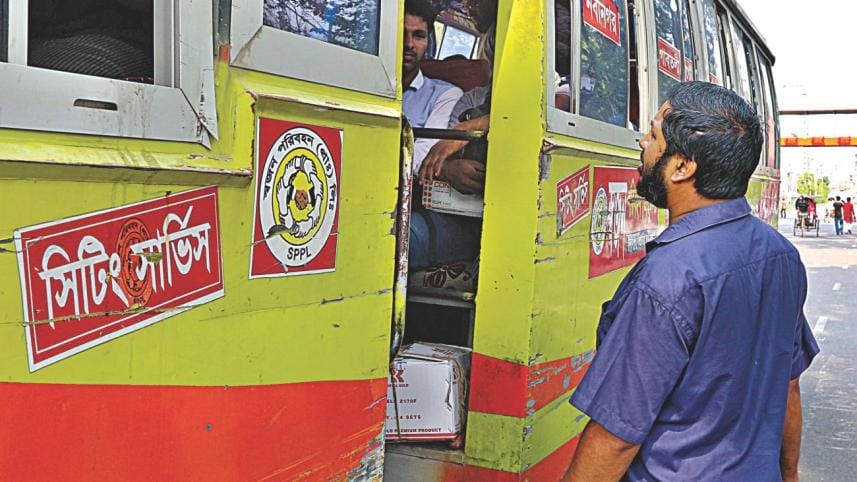Uniform fare in city buses?

With transport owners set to stop so-called “seating service” today, passengers are sceptical about getting benefits in the absence of strict monitoring by the government.
The move to stop such self-devised service came amid media reports that the bus authorities were charging passengers high fares in the name of seating service, gate-locked or special service.
The transport owners on April 4 announced that such services would stop operating in the capital after April 15.
At a meeting yesterday with officials of Bangladesh Road Transport Authority (BRTA), they agreed to follow the fare chart set by the government.
Talking to The Daily Star, Khondaker Enayet Ullah, general secretary of Dhaka Sarak Paribahan Malik Samity, said vigilance teams would be employed today at five points -- Asad gate, Agargaon, west side of Airport, in front of Engineers Institute and Jatrabari -- to make the decision effective.
Five executive magistrates from BRTA and adequate police members will be assisting the teams, he said.
According to the Enayet-led association, at present approximately 150 transport companies are operating around 4,500 buses in the city.
The “seating service” is illegal, according to BRTA officials.
Many buses were seen accommodating standing passengers yesterday. But they were charged excess fare.
Passengers expressed fear that transport workers would continue charging them extra fare in overcrowded buses if the authorities didn't keep a watch on the bus operation.
Around 3:30pm, for less than four-kilometre ride from the Jatiya Press Club to Karwan Bazar by a bus of Airport Bangabandhu Avenue Paribahan Ltd, the conductor charged this correspondent Tk 10. Passengers, who got down at Shahbagh or Bangla Motor, also had to pay the same amount.
When the passengers protested, bus conductor Hanif smiled and said, “We are taking standing passengers from today to begin the new practice but will fix the new fare tomorrow [today].”
A section of bus owners had been ignoring BRTA-set fare charts for many years. They had employed self-devised “seating service” and charged passengers high fares. But during rush hours they used to take standing passengers.
The buses with stickers reading “seating service” glued to their windows didn't hang the fare chart, which was made mandatory by BRTA. Rather, they used to show charts they made up for taking extra fares from passengers.
In a recent meeting, the transport owners decided to operate vehicles complying with the route permit that the vehicles would pick passengers from designated stoppages and allow them to travel even by standing.
The transport owners were also ordered not to collect more than the fares approved by the government, Enayet said.
Nazmul Ahsan Majumder, director (enforcement) of BRTA, said five BRTA mobile courts would be monitoring bus operation.
The buses giving seating service got route permits just like others and so same conditions are applied to all of them, he said.
“If these buses don't operate like others, they will face legal action.”
 For all latest news, follow The Daily Star's Google News channel.
For all latest news, follow The Daily Star's Google News channel.
Comments